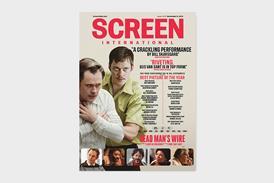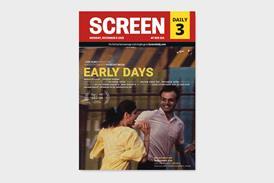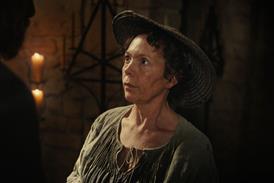
Working Title co-chairs Tim Bevan and Eric Fellner say there is “a real opportunity” in the sub-$15m budget feature film space, but that “films need to cost less money, and they need to be bolder in that space.”
Speaking in their Screen Talk at the 68th BFI London Film Festival, Bevan cited – without naming - a film Working Title has just made up in Manchester “that completely falls into that – one of the most energetic and fun movies we’ve done.”
Working Title shot Alicia MacDonald’s romantic comedy CC: Emily, starring Spike Fearn and Angourie Rice, in Manchester this late summer/autumn.
“Films need to cost less money, and they need to be bolder in that space,” said Fellner, citing Coralie Fargeat’s The Substance, a Working Title production that is currently performing well in UK-Ireland cinemas through Mubi. “If it’s really out there, people are interested. They don’t get turned off,” continued Fellner. “We will start to make more under-$15m movies.”
Bevan then noted “a shyness at studio level” around adventurous films such as The Substance. “You understand it, because of the economics, but there’s an opportunity there. Probably there’s a new business model [that could support such films].”
“Right now, what the industry desperately needs is innovative new filmmakers, creative ideas,” said Bevan, when asked about Working Title’s long-term repeat partnerships with certain creatives. “If we didn’t keep on regenerating with new ideas and people, we would die.”
Substance story; London costs
The 60-minute session was hosted by BFI CEO Ben Roberts, as part of the LFF industry programme.
“We’re genre-neutral, we’re director positive,” said Fellner when Roberts suggested that The Substance was an infrequent excursion into horror filmmaking for the company. “That’s what attracts us to material. I managed to track down Coralie, I went to Paris a few times to have lunch with her and said ‘we should make your next film, whatever it is.’ She was trusting enough to agree to do it; we went into it believing in her.”
“I personally didn’t understand just quite how full-on it was going to be,” laughed Fellner. “But it’s bringing people to the cinema,” he added, citing the success of the Mubi theatrical release. “It shows streaming and theatrical can exist together.”
Returning to the topic of their recent Manchester shoot, Bevan said, “It’s got very expensive to shoot in London. Manchester is a much more film-friendly place to be. It is tricky to make films in the city now.” He added that Working Title’s London-set Blitz, made with Apple and New Regency and which opened this year’s LFF, “was primarily a studio picture; the streets on the whole were in Hull.”
“Beyond London, the UK is the best place in the world to make movies,” said Fellner. “That has changed radically from when we first started. You’re now seeing everybody coming – a really thriving community of filmmakers, craftspeople.”
Roberts asked the pair about their 25-year first-look partnership with Universal Pictures, through which Working Title could contractually produce any film with a budget up to $35m. The deal was renewed in 2020.
“It has changed a little bit, but marginally,” said Fellner. “They trust us, we trust them. A lot of the executives have been [at Universal] for ages – one of the most solid studios in terms of turnover. They don’t want to make all of our films; but if they don’t, they tell us and we just go and make it elsewhere.”
“Given the industry has been tumultuous in the last five years, we’ve been unbelievably lucky [to have Universal as partners],” said Bevan. “Being part of a worldwide distribution network is unbelievably powerful.”
LFF runs until Sunday, October 20.
























No comments yet